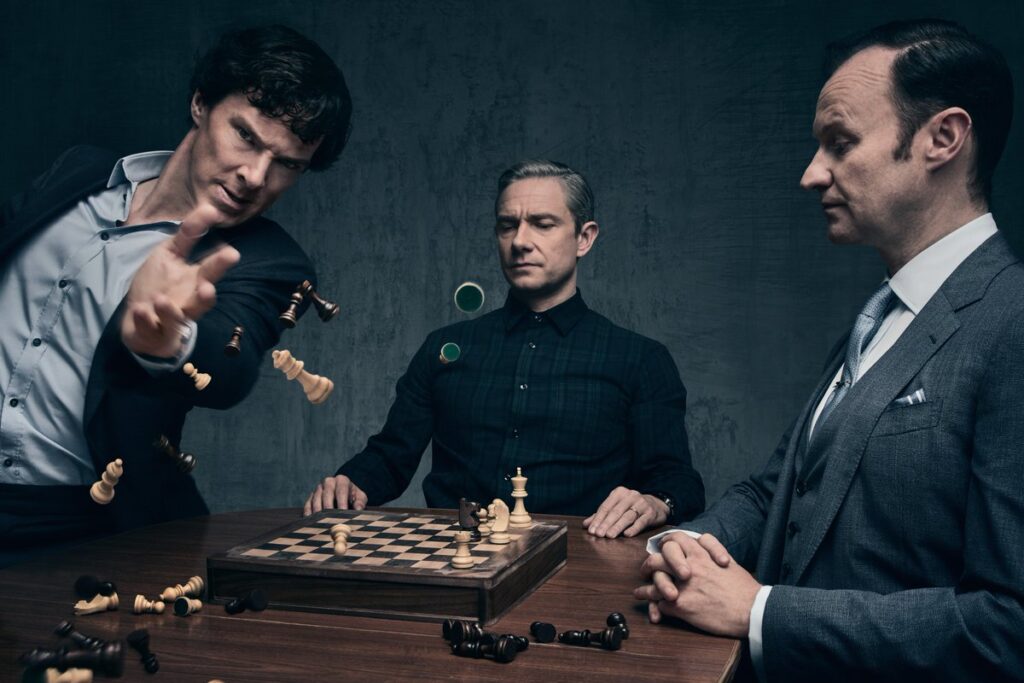Another year, another series of BBC’s Sherlock, another flock of hot takes that reflect how far public opinion of the series has fallen. It’s a series saddled with so many problems it’s hard to know where to start. Yet in spite of that, we all keep watching.
After initially blowing audiences away in 2010, it felt like Steven Moffat and Mark Gatiss had a new vision for where to take the classic material. Now, it’s more clear that their vision is an incoherent mess, lined with just enough merits to inspire a large following and even larger expectations. It’s not really a surprise that Sherlock has again fallen short of what it could be.
What’s surprising is that we expect anything else.
I’m sure there are people out there who genuinely enjoy the show, but there are so many more people entranced with what the show could be. After all, the best elements of Sherlock are all surface-level. The casting, the performances, the sets, the music, the direction. In terms of aesthetics, it sets a high bar for modern British TV and in terms of storytelling, it’s overtly going for a reaction. Like many (better) TV shows and its source material, Sherlock has the power to make us feel and think – even if just for a moment. However, it doesn’t always use that power for good.
At its best, episodes bounce between the sharp and genuine chemistry of its leads. At its worst, it over-invests in the drama that drives the show forward and misses the mark entirely. What you’re left with is a show that thinks itself much smarter than it is.
While there’s a kind of confidence and swagger to appreciate in this approach, it has over time worked against Sherlock. Where it was once seen as blazing a trail, it’s now regarded as a show spinning out of control in ever more frustrating ways.
Although it’s easy (and often-justified) to point the finger at Moffat, Sherlock isn’t a conventional TV show. It’s got a structure and form that comes with its own challenges. Not content with walking an unconventional line between tele-movie and semi-annual serial, it’s also the BBC’s flagship for British drama. As a result, the stakes are enormously high not just with each season, but with every episode.
Many cry for the series to return to the more episodic storytelling of the series’ first two seasons (and the source material), though, it’s entirely understandable that Moffat and co are keen to avoid such capers. They only get three episodes a series and, given Season 1’s “The Blind Banker” is so widely reviled, it’s easy to imagine why they steer clear of stories like it, instead relegating Sherlock‘s everyday cases to the margins of the ongoing melodrama between Martin Freeman‘s Watson and Benedict Cumberbatch’s Holmes.
The problem is that this gradual arc away from the telling stories about the standalone cases puts them in a fascinating creative deadlock with Arthur Conan Doyle’s own works. Sherlock Holmes as a character pretty much exists to solve cases, but the people running the show fundamentally don’t want to tell those kinds of stories.
Which is not to say that they don’t care. Even if they (frustratingly) miss the mark on a regular basis, it’s clear that Moffat and Gatiss do have some sort of reverence for the source material. It’s a unique brand of romanticism that dwarfs common storytelling wisdom and even faithfulness to that material, but it’s definitely there.
As a result, even when it’s not always well thought-out, Sherlock still comes across as something that’s had a lot of thought put into it. And there’s something understandably compelling about that which continues to draw us back to the show no matter how bad, lazy and indulgent it gets.

Squint and you can see something that’s only a few minor course-corrections away from redemption.
Perhaps what the show needs is to regenerate. The BBC already treat new seasons of Sherlock as a big event in the same way they do new seasons of Doctor Who – maybe the latter can provide a template for the former to course correct.
Imagine a world where Benedict Cumberbatch, Martin Freeman, Stephen Moffat and Mark Gatiss commit to one final season of Sherlock before handing the reigns of the show over to a set of new voices and faces. That might be just what the series needs.

